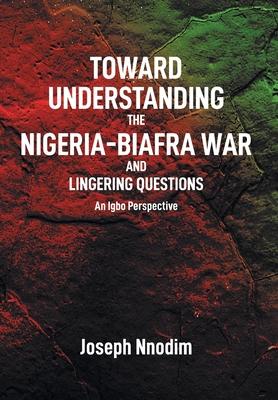Toward Understanding The Nigeria-Biafra War and Lingering Questions

Toward Understanding The Nigeria-Biafra War and Lingering Questions
Toward Understanding the Nigeria-Biafra War and Lingering Questions is a well-researched account of the British engagement with the peoples of the lower Niger river basin which resulted in the fabrication of a Nigerian state under insincere and contrived premises. The myriad ethnic groups shared nothing cherishable and never managed to find commonality of purpose or civic principle, no small thanks to colonial policies predicated on divide et impera. As a result, the indigenous political class was bequeathed a toxic legacy of interethnic suspicion, incoherence, and disharmony at independence in 1960. Crisis followed crisis, until the armed forces intervened and the First Republic collapsed in 1966. A further cascade of tragic events, including the mass slaughter of people of the East, caused that region to proclaim itself the independent sovereign Republic of Biafra in 1967. A civil war ensued, and the critical developments during the crucial combat period are exhaustively chronicled.
The Biafran capital, Enugu, fell after three months of bitter fighting. A war of attrition ensued, lasting twenty-seven more months, during which at least one million babies and children succumbed to inanition. The Nigeria-Biafra War stands out ignominiously as one of the very rare conflicts in modern history in which one of the belligerents overtly declared its intention to starve its adversary into submission and clung to that policy even when it became abundantly clear that the victims were predominantly babies. No proper accounting has been demanded or given.
The Igbo were the largest of the ethnic groups in the Republic of Biafra. They had been in the vanguard of the struggle for Nigeria's independence and unity but paradoxically became the whipping boy in the postcolonial era when the country lost its collective mind. They were subjected to untold savagery before as well as during the civil war, whose repercussions they continue to suffer to the present day. Their ethnography is explored in the context of both the conflict and the entirety of their Nigerian experience.
PRP: 235.29 Lei
Acesta este Prețul Recomandat de Producător. Prețul de vânzare al produsului este afișat mai jos.
188.23Lei
188.23Lei
235.29 LeiLivrare in 2-4 saptamani
Descrierea produsului
Toward Understanding the Nigeria-Biafra War and Lingering Questions is a well-researched account of the British engagement with the peoples of the lower Niger river basin which resulted in the fabrication of a Nigerian state under insincere and contrived premises. The myriad ethnic groups shared nothing cherishable and never managed to find commonality of purpose or civic principle, no small thanks to colonial policies predicated on divide et impera. As a result, the indigenous political class was bequeathed a toxic legacy of interethnic suspicion, incoherence, and disharmony at independence in 1960. Crisis followed crisis, until the armed forces intervened and the First Republic collapsed in 1966. A further cascade of tragic events, including the mass slaughter of people of the East, caused that region to proclaim itself the independent sovereign Republic of Biafra in 1967. A civil war ensued, and the critical developments during the crucial combat period are exhaustively chronicled.
The Biafran capital, Enugu, fell after three months of bitter fighting. A war of attrition ensued, lasting twenty-seven more months, during which at least one million babies and children succumbed to inanition. The Nigeria-Biafra War stands out ignominiously as one of the very rare conflicts in modern history in which one of the belligerents overtly declared its intention to starve its adversary into submission and clung to that policy even when it became abundantly clear that the victims were predominantly babies. No proper accounting has been demanded or given.
The Igbo were the largest of the ethnic groups in the Republic of Biafra. They had been in the vanguard of the struggle for Nigeria's independence and unity but paradoxically became the whipping boy in the postcolonial era when the country lost its collective mind. They were subjected to untold savagery before as well as during the civil war, whose repercussions they continue to suffer to the present day. Their ethnography is explored in the context of both the conflict and the entirety of their Nigerian experience.
Detaliile produsului









